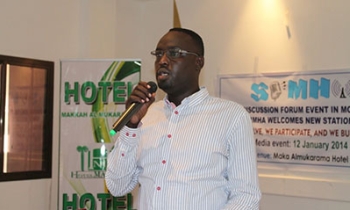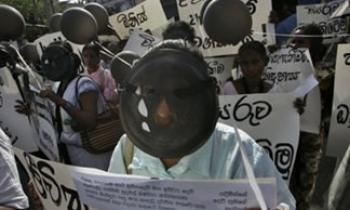The Health Journalism Partnership (HJP) has launched its website to bring together health journalism resources, training opportunities, analyses, distinguished health reporting and a global online "map" of journalism training and support organisations. Internews Network, Panos Institute London and the International Center for Journalists (ICFJ) launched the pilot phase of the partnership at the end of 2005. The goal was to boost donor support for health journalism and raise awareness of the need to support and provide training to journalists to report accurately and well on public health issues.

HJP is collecting data on more than 300 organisations that provide training and support to journalists. Responses are incorporated into a searchable database, with selected information made available to the public on the HJP website (healthjournalism.net) with respondents' permission. Data is available for use by donors in deciding how to target resources and support to build media capacity to cover health issues. The database and website is also useful for networking and connecting organisations that train and assist journalists, as well as to media and journalists who seek training, grants, analysis, role models and other information and assistance.
The HJP pilot phase, supported by the Bill and Melinda Gates Foundation, the John S and James L Knight Foundation and the Open Society Institute, is:
- documenting existing programs to support and improve health journalism,
- raising awareness of the need to build media capacity to address public health issues with critical analysis and professional standards,
- distributing small grants in developing countries, and
- soliciting additional support from interested donors.
HJP is currently conducting a research on health journalism support efforts in 23 countries. The resulting country profiles draw on questionnaire responses, existing studies, reports and evaluations of health journalism/media support initiatives, as well as interviews with journalists, health or media development nongovernmental organisations (NGOs) and others. Besides, HJP is developing five case studies on countries where support or training for journalists has made a difference in health policy, health care or health outcomes.
HJP is providing grants to media organisations that demonstrate the need and ability to improve and promote coverage of key health issues. In the initial round of grants this year, 82 applications were evaluated by all three partners and external experts. Powered by the funding, Nigeria's PROJEKTHOPE introduced its first round of HIV reporting interns, while Communication for Development and Learning in India began preparing for its first health reporting workshop scheduled for 15-18 July. Projects will last through September 2006.

HJP also engages interested donor organisations whose assistance can help enhance the quality and quantity of effective health journalism in the developing world. Partners will distribute research, make presentations to donors and conduct roundtable discussions with donors, academicians and journalism training and support organisations.
HJP has developed a checklist of critical elements to long term capacity development for health journalists. These elements have been developed through the collective practical experience of the three partner organisations in working with media professionals around the world – elements that HJP will continue to test during the pilot project. "Each of these elements are critical to developing a cadre of health journalists from a variety of print and electronic media who can produce news and feature reports on health issues, and gain confidence in their role as journalists," the website says.
HJP has outlined the following key elements of journalist capacity development:
- Long term follow-up should be provided to journalists – mentorship, access to ongoing advice, guidance, editing skills, commissioning of articles, and facilitation and support of journalist peer and professional networks.
- Resources (equipment) should be provided when necessary to allow for professionalism in health journalism; many journalists are not technologically prepared or equipped to practice what they are being trained for.
- Capacity building should include support to journalists on how to find sources of information, how to access to information resources, and how to critically appraise their accuracy.
- Local language provisions should be made when media are broadcasting or publishing in local languages.
- Multiple end-products from each journalist should be the outcome of all capacity building programmes – are quality stories being broadcast, articles printed as a result of interventions?
- Evaluation of capacity development should measure both the professional development of the journalists as well as the increase in frequency and improvement in quality of the health coverage.
- Training workshops, a core activity of capacity development, should be conducted in small groups and should be media specific (print journalists together, radio journalists together, television journalists together, online journalists together).
- The primary focus of any training workshops should be good journalism, not a lecture on health issues – and all health information should be appropriate and relevant.
- Health information provided in support and training should be appropriate and relevant to local context and priorities and address the broader social dimensions of health, beyond a solely medical focus.
- Experienced journalist trainers should lead the capacity development process for health journalists – a key barrier to health journalism is promotion of good reporting technique/story telling/interviewing/story development – journalists should not be trained primarily by public health educators.
- Hands-on; site visits should be incorporated into all capacity development modules – the health care services, issues, need to be seen/experienced by the journalists – and local context should be the prevailing focus.
- Capacity development should be relevant to the local context in which the journalist works (based on local needs assessment/research). Technical and equipment training should be relevant to media facilities they work with.
For HJP, effective health journalism also means understanding the health issues from medical, social, developmental and public health policy angles; the ability to frame and communicate stories in a variety of formats – news, analyses, features, talk shows, debates; the ability to draw on a range of sources and voices to gather all the information and stories.
In order to build this understanding, capacity building for health journalists should be partnered with targeted actions toward the overall media environment. Some of these targeted actions, according to HJP, could be:
- Management buy-in to long-term programmes – capacity building must include support of media owners, management and editorial staff for journalists to expand their work in coverage of public health issues.
- Networking media and public health professionals for effective sharing of information with the range of public health players and media development players.
- Advocating improvements in the environment for professional journalists, such as media regulatory frameworks, career enhancements and institutional support for journalism as a profession – and the journalists' role in public health.
- Raising journalistic ethics – through constructive dialogue on how journalists cover health issues – individual privacy issues, conflict of interest issues, responsible coverage, etc.
- Conducting research to assess the impact of health journalism on individual, community and public health; articulate examples of good health journalism and good health journalists; clarify the role health journalists can play in supporting public health dialogue and debate.
- Sustainability – supporting curriculum development programmes at universities and training colleges for students and practicing journalists.









